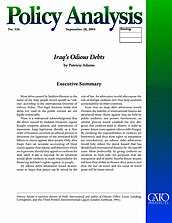Most debts created by Saddam Hussein in the name of the Iraqi people would qualify as “odious” according to the international Doctrine of Odious Debts. This legal doctrine holds that debts not used in the public interest are not legally enforceable.
There is a widespread acknowledgment that the debts created by Saddam Hussein’s regime bought weapons, palaces, and instruments of repression. Iraqi legislators should, as a first order of business, establish an arbitral process to determine the legitimacy of the estimated $120 billion in claims against their people. Only after Iraqis have an accurate accounting of these claims against their nation, and determine which are legitimate, should they appeal to creditors for debt relief, if any is required. To do otherwise would allow creditors to evade responsibility for financing Saddam’s regime against its people.
An odious debts arbitration would demonstrate to Iraqis that justice can be served by the rule of law. An arbitration would also expose the role of foreign creditors and thus help establish accountability in other countries.
Fears that an Iraqi debt arbitration would threaten the stability of international finance are misplaced: most claims against Iraq are held by public creditors, not private; furthermore, an arbitral process would establish the due diligence that creditors need to observe in order to protect future loans against odious debt charges. By clarifying the responsibilities of creditors (or borrowers), and thus their rights to repayment (or repudiation), an odious debt arbitration would help reduce the moral hazard that has destabilized international finance for the past 60 years. More profoundly, by giving creditors an incentive to lend only for purposes that are transparent and of public benefit, future tyrants will lose their ability to finance their armies, and thus the war on terror and the cause of world peace will be better served.
About the Author

This work is licensed under a Creative Commons Attribution-NonCommercial-ShareAlike 4.0 International License.
